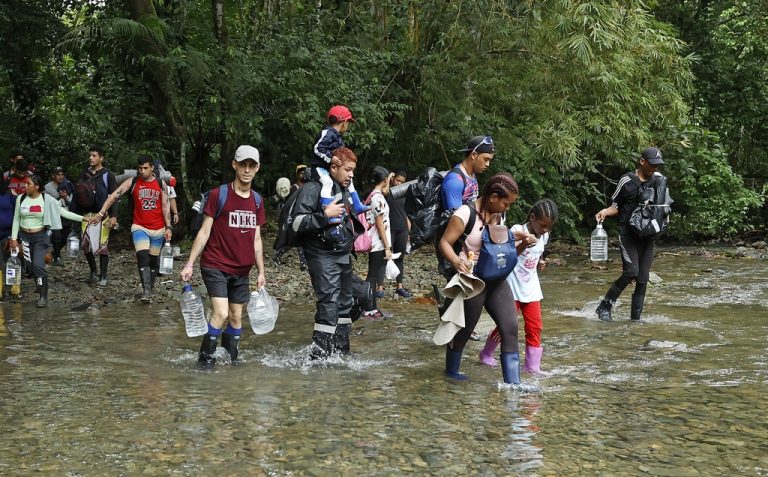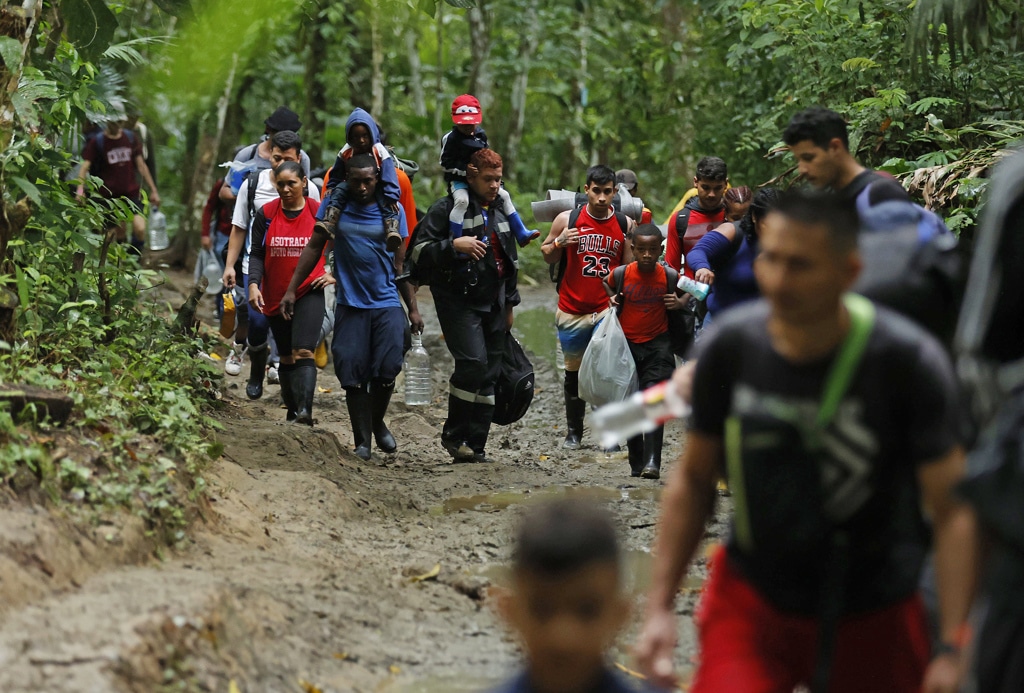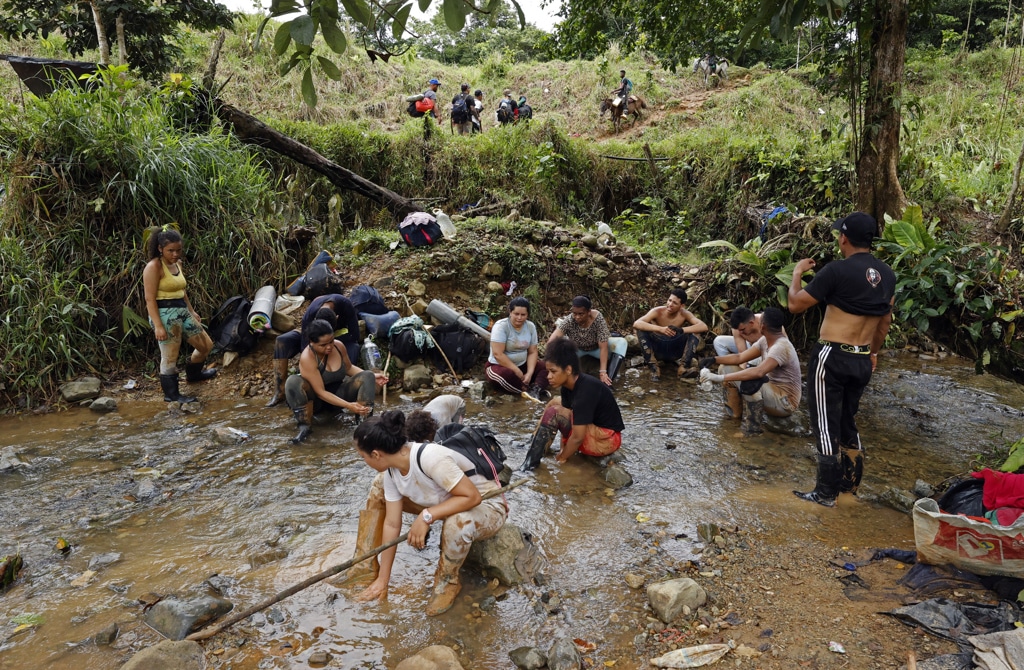15 de octubre 2022

“NicaraguAmor” Cultural Caravan for Nicaraguans in the USA

PUBLICIDAD 1M
PUBLICIDAD 4D
PUBLICIDAD 5D
So far this year, over 150,000 people have crossed into Panama via the Darien Gap, where rapes and murders are common.

So far this year
“They say Venezuela is straightening itself out, but look how things are,” says Jose Muñoz, while he gestures towards the hundreds of Venezuelan migrants grouped along the border between Colombia and Panama, preparing to cross the dangerous jungles of the Darien Gap in their trek towards the United States.
They lie on the beach, resting and killing time, while one boat after another takes off from the Caribbean town of Necocli, on the Uraba Gulf. The boats will ferry migrants across to the place where they’ll be entering a mountainous jungle, following a merciless route.
“The Darien isn’t as dangerous as what we’re leaving behind,” Jose asserts obstinately. This argument is repeated over and over again by those who are readying themselves to traverse the jungle.
They leave behind a “silent dictatorship” that has made this harsh trek through the jungle seem frequently like the best option. To make the journey, the migrants must put themselves in the hands of criminal gangs or traffickers. It’s unknown how many lives have been lost along this path.
“The Darien Gap is a light of hope for us; leaving our families behind is more painful,” this father who is crossing alone tells the EFE news agency.
The deciding factor for him was not having a way to buy food for his children. The fear that they could get sick, with no way to help them get well. “That’s the reality we live in Venezuela, not the one they [the government] claims. (…) It’s a dictatorship,” he affirms.

Migrants trying to get to Panama via the Darin Gap and then continue on to the United States. Photo: EFE/ Mauricio Dueñas Castañeda
So far this year, more than 150,000 migrants have crossed through this dangerous border region that separates Colombia from Panama. In that jungle, the rivers threaten to sweep away entire families, and the slopes to swallow whoever steps on them, while the rapes and murders will be left uninvestigated, between the trees.
Seventy one percent of this record number of migrants, which has already surpassed the total from any other year, are Venezuelans.
Like Jose, Angelismar had already been debating for years when she should take this step. She saw how prices rose, how their money didn’t stretch far enough, but it wasn’t until her son, Nelson Giovanny was born, less than a year ago, that she finally dared to leave Venezuela to give him a better future.
She’s making the crossing with the baby, who is still breastfeeding, plus her husband and part of her family. Her mother, Ada Yolimar, is also with her, a Venezuelan who knows well what it means to live in a country where you’re excluded for thinking differently.
She was a student of gas engineering when she signed a letter opposing president Hugo Chavez. The action ended with the firing of 19,000 workers from the state-run Pdvsa [Venezuela Petroleum Corporation] and the creation of a blacklist which included her name.
With that list, she went from having a brilliant future in a country that demanded professionals for its key industry, to seeing all doors closed to her. She spent years cleaning floors and other people’s houses. She never had the money to emigrate, nor does she have them now, but even so she’s made the leap.
Over 6.1 million Venezuelans have left their country in what has comprised the second largest migration wave in the world, surpassed only by Syria, according to the organization Refugees International.
A large part of the migrants crossing the Darien come directly from Venezuela, but they also come from counties such as Peru, Chile, or Colombia, where they originally tried to settle. Colombia is the country that took in the greater part of the immense Venezuelan exodus. According to the latest data, there are nearly 2.5 million Venezuelans in Colombia’s towns and cities.
Ismali, for example, spent five years in Bogota, selling sweets and other products in the Transmilenio buses. However, everything has gotten “very expensive”, and necessity is pushing him to seek new opportunities for Yeremias, his two-year-old, who cuddles in his arms while waiting to set off for the Darian.
“Because of the economy”… “Because we were living badly”…“Hunger”. When asked their motives, the migrants repeat these answers again and again. A cousin that lives in some US city has told them that you make good wages there. They’ve seen their neighbor build a new house, thanks to the money his father sent from Chicago via Western Union. Or a distant friend told them to come, that they’d be received there, and that it wasn’t so hard.
They’re planning to seek asylum in the United States, encouraged by the words of President Joe Biden, who affirmed a few weeks ago that returning the irregular migrants to countries like Venezuela, Cuba or Nicaragua “wasn’t rational”. However, Biden has since changed his mind and is working with Mexico to retain part of the Venezuelan migrants there.

Migrants resting along a river during their crossing of the Darian gap. Photo: Mauricio Dueñas / EFE news agency
Between October 2021 and August 2022, more than 150,000 Venezuelans have been detained at the US border with Mexico. This compares with 50,499 in the same period the year before.
In August alone, some 25,000 Venezuelans were intercepted by US border patrol agents, according to data from the US Office of Customs and Border Patrol.
“Last year was the Haitians turn, now it’s ours,” the Venezuelans assure us. They say so from the other side, before heading into the thick vegetation. They’re trusting that what’s coming will be better than what they leave behind, but without being fully conscious of what lies ahead for them.
This article was originally published in Spanish in Confidencial and translated by Havana Times
PUBLICIDAD 3M
Agencia de noticias internacional con sede en Madrid, España. Fundada en Burgos durante la guerra civil española en enero de 1939.
PUBLICIDAD 3D